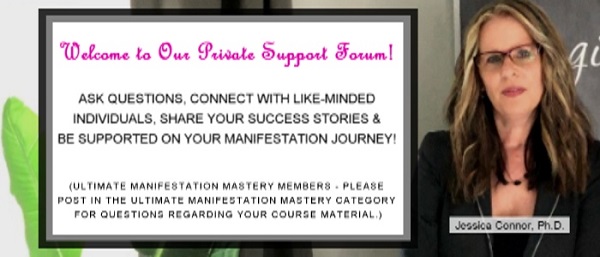Howdy, Stranger!
It looks like you're new here. If you want to get involved, click one of these buttons!
Categories
- 272 All Categories
- 159 Ultimate Manifestation Mastery Support
- 25 Introduce Yourself to the Tribe!
- 1 Find A Manifestation Buddy
- 34 General
- 2 Tips & Tricks
- 10 Money, Abundance and Freedom
- 2 Higher Consciousness
- 16 Relationships
- 4 Healthy Living
- 2 Entrepreneurship & Business
- 9 Everything Else Law of Attraction
In this Discussion
New small successes manifested
Hello tribe, it's been a while and I have came a long way in my journey to manifesting my goal.
I tried to manifest a small 2nd goal while I'm working on my big goal but I found myself focusing on my big goal and forgot my 2nd! That's ok as we've established that they're all connected anyways.
few weeks ago, I started experiencing regular small successes, and I still do, which has excited. Every day I express my gratitude in many ways and try to keep my emotions and vibes elevated to continue my successes. However, I started feeling the weakening of the dopamine impact; as I've learned from the feedback loop section in the course. I now have a better understanding of the feedback loop and how it works, it's amazing how you have covered the process exactly as we would experience it, Jessica!
My question here is, are those early opportunities of small successes that gradually began to feel less significant.still considered part of the manifestation even though there is no correlation between them and my big goal? I am wondering if these small successes were the groundwork for building the feedback loops that my creative machine utilizes as part of the program. Sometimes I think maybe I have a belief ceiling but I still want more out of life than what I'm experiencing.
And what do I do now that I feel the weakening of the small successes impact and significance to me.. I had interim breaks last 2-3 weeks due to hectic schedule but I'm back full force to the process using affirmations, meditations, and I use your youtube channel which highly motivates me and helps a lot in keeping my emotions high.

Comments
Important note: When we update the reward value of our behavior, we can
easily create new habits that drive us towards success.
Here’s how I did this:
1. In
psychology, there is a term known as implementation intention. This is a
strategy that leads to better goal attainment and assists in modifying
behavior, brain reward and, in turn, creating new habits. With these types of
intentions, you specify the when, where and how portions of goal-directed
behavior. For example, “I will study at my desk on (specified date and time)
for 1 hour.” This automates action and assists in overcoming procrastination.
In other words, it makes a person much more likely to perform an action.
3. Using the implementation intentions just mentioned, write a list of committed actions to follow through with
that will lead you towards success. In the second column, list rewards
that you will allow yourself once those actions are completed. These are daily
actions and daily rewards. So, it doesn’t have to be all work and no play. This
teaches brain that it will receive a reward after doing something that moves you towards your big goal and will keep you from depleting your dopamine levels early
in the day, which causes a decrease in motivation.
4. Remove yourself from distractions that will activate the dopamine craving your related to old habits that don't drive you towards success. For me, I
would move my phone to another room, avoid social media and I stopped buying snack
type foods that might give me an excuse to walk away from a commitment.
5. Personally, I put a note up near my desk that reads, “Procrastination feels bad. Success feels
great!” This reminds my brain of the rewards it will receive for creating
success. Each trigger we have creates a behavior that creates a reward for the
brain. Starting a behavior can sometimes be the thing that blocks us. This note
triggered me to start a behavior that was working for me and the life I wanted
to live, which is the reward. It’s important to note here that the behavior with
the biggest reward is always the one we will act out.
6. I
gave myself positive rewards that were linked to increased dopamine levels.
These included listening to high vibrational music, spending time in nature
soaking up the sun, restful sleep, meditation and creating vision boards that
included things that I considered as successful outcomes.
To change a habit, we have to change the experience of
the rewards we are getting from our behavior. In doing so, we create automatic
behaviors that become habitual and drive us towards success.
Although more centered on action than just intention, these tips are a great way to create those automatic habits that drive you towards your goals. Once those habits are in place, the behavior will also become automatic.
I hope you find this helpful and that it answers your questions! :)
-Jessica